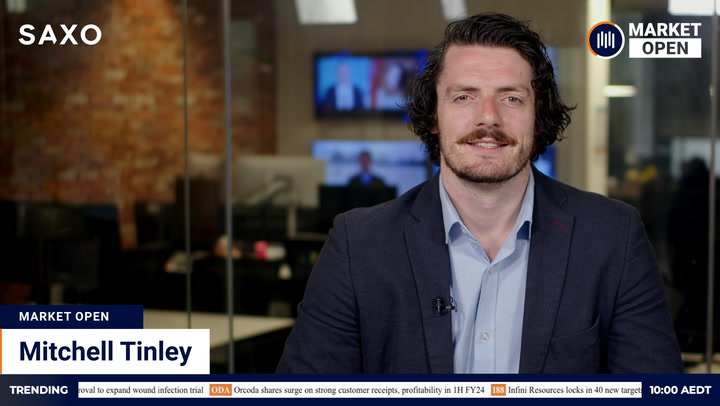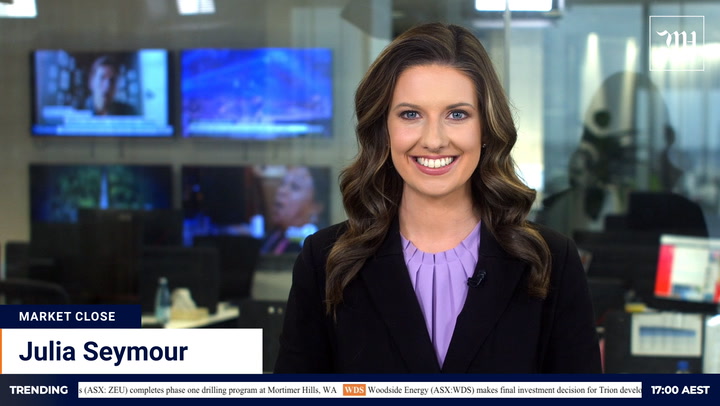Australian shares were poised to open little changed after a global recession warning from economic bellwether FedEx spurred further selling at the end of Wall Street’s worst week since June.
Wall Street’s main indices fell to two-month lows as investors sold stocks levered to the global economy. Iron ore and aluminium declined. Oil trimmed a third straight losing week. Gold edged off its weakest level in two years.
ASX futures eased two points or 0.03 per cent to 6737. The S&P/ASX 200 skidded 1.4 per cent on Friday to its third losing week in the last month. The Australian benchmark ended the week just 18 points above a seven-week low.
Wall Street
US stocks slumped as a profit warning from FedEx compounded doubts about the health of the global economy ahead of a Federal Reserve rates decision.
The S&P 500 dropped 28 points or 0.72 per cent. The Dow Jones Industrial Average shed 139 points or 0.45 per cent. The Nasdaq Composite lost 104 points or 0.9 per cent.
FedEx tumbled 21.4 per cent to its worst loss on record after withdrawing its full-year guidance. The shipping company said demand had dropped off as the global economy “significantly worsened”. CEO Raj Subramaniam told CNBC a worldwide recession was likely.
“Global volumes declined as macroeconomic trends significantly worsened later in the quarter, both internationally and in the U.S. We are swiftly addressing these headwinds, but given the speed at which conditions shifted, first quarter results are below our expectations,” the FedEx chief said.
The warning from Subramaniam carried extra weight because the firm’s earnings are seen as a proxy for global demand. The World Bank warned last week that the world’s three largest economies – China, the US and the euro-zone – were slowing sharply, elevating the risk of a global recession.
Rival UPS sank 4.48 per cent. Amazon gave up 2.18 per cent. General Electric fell 3.66 per cent after its CFO warned supply-chain pressure was causing delays in deliveries.
Analysts have been cutting their S&P 500 earnings expectations over the last three months. Seven of eleven sectors are now expected to show year-over-year earnings declines for the third quarter.
Wall Street’s three main benchmarks closed at their lowest since mid-July. Weekly declines of 4.8 per cent for the S&P 500 and 5.5 per cent for the Nasdaq were the largest since June. The Dow’s weekly loss of 4.1 per cent was its worst since August.
“It’s been a tough week,” David Carter, managing director at JPMorgan, told Reuters. “We are facing in this toxic brew of high inflation, high interest rates and low growth, which isn’t good for stock or bond markets,” he added.
Australian outlook
A new week dawns with the S&P/ASX 200 near two-month lows and looking fragile. The Australian benchmark declined 147 points or 2.1 per cent last week to a third weekly loss from the last four. From a technical perspective, the current market trend is negative, defined by a series of lower lows and lower highs since mid-August.
The index closed on Friday just 18 points above the September 7 seven-week low. A break below that level would open the door to support around 6600, then a possible retest of the June lows.
The dollar is also in a downtrend, hitting a two-year low of 66.7 US cents on Friday before bouncing to 67.17 US cents. A weaker dollar is a plus for exporters, a negative for importers. This year’s decline has come as risk aversion lifts the US dollar index to its highest in around two decades.
Nine out of eleven US sectors fell on Friday. The winners were defensive. Consumer staples gained 0.25 per cent and real estate a skinny 0.03 per cent.
Hardest hit were energy -2.17 per cent, industrials -2.06 per cent and materials -1.56 per cent. The financial sector shed 0.97 per cent.
A public holiday on Thursday and a US rate hike on Wednesday night will cast long shadows this week. Thursday is an Australian market holiday to mark the death of Queen Elizabeth II (New Zealand takes the following Monday). Public holidays in the UK and Japan today will also temporarily slow the global money-go-round.
The US Federal Reserve concludes a two-day meeting on Wednesday night and is expected to raise the target federal funds rate by at least three-quarters of a percentage point. The market currently puts the likelihood of an increase of a full percentage point at 18 per cent.
Highlights on the domestic economic calendar include the minutes from this month’s RBA meeting and weekly consumer confidence data tomorrow and flash manufacturing and services industry data on Friday.
AGM season is on the horizon. New Zealand firms Mercury NZ and Air New Zealand hold annual meetings on Thursday. Insurer Suncorp holds its AGM in Brisbane on Friday.
Companies releasing earnings this week include New Hope on Tuesday and Washington H. Soul Pattinson and Brickworks on Wednesday.
Dividend season starts to wind down from here. Among companies trading ex-dividend this week are: Qube (Monday); Cochlear, Adbri and Atlas Arteria (Wednesday); and Latitude (Friday).
IPOs: the week’s only potential new listing at this stage is Australia Sunny Glass on Wednesday.
Commodities
Oil pared a third straight losing week as supply doubts helped offset questions about the health of demand as the global economy slows. Brent crude bounced 51 US cents or 0.6 per cent to settle at US$91.35 a barrel. For the week, the international benchmark shed 1.6 per cent.
“Traders have started to believe OPEC needs to do more to control supply if it wants to keep oil prices higher. Under the current supply, the chances that prices will continue to move lower, and we could see crude oil prices easily reaching near the $75 price mark,” Naeem Aslam, chief market analyst at AVATrade, said.
A decline in Chinese property prices helped drive iron ore lower. New home prices fell 1.3 per cent year-on-year last month, the fastest pace since 2015. Property investment declined at the fastest pace since December.
The most-traded ore contract on the Dalian Commodity Exchange dropped 1.2 per cent to 715 yuan (US$101.89) a tonne. The spot price for ore landed in China fell US$1.52 or 1.5 per cent to US$99.06 a tonne. For the week, the spot price shed US$3.17 or 3.1 per cent.
BHP‘s US-traded depositary receipts gave up 1.41 per cent. The miner’s UK listing shed 0.69 per cent. Rio Tinto gave up 0.33 per cent in the US after rising 0.32 per cent in the UK.
Gold clambered off a two-year low after a report showed American consumers were less pessimistic about inflation. Gold for December delivery settled US$6.20 or 0.4 per cent ahead at US$1,683.50 an ounce. The NYSE Arca Gold Bugs Index gained 0.88 per cent.
For the week, the yellow metal lost 2.6 per cent. Prices have collapsed this year as the Fed’s war on inflation lifts the greenback to levels last seen in 2002.
“Gold may very well struggle to rally for as long as the Fed says that fighting inflation remains its No.1 concern,” Adrian Ash, director of research at BullionVault, told MarketWatch. “The flip, when it comes, could see a swift and sharp bounce-back.”
Copper overcame early weakness during a mixed session for industrial metals. Benchmark copper on the London Metal Exchange bounced 0.3 per cent to US$7,869 a tonne.
“China’s economy remains weak and is still not offering any good reason to go long metal. But it is very risky to go short,” Gianclaudio Torlizzi, partner at T-Commodity, said.
Nickel jumped 4.9 per cent to US$24,229. Tin gained 1.5 per cent. Aluminium fell 1.3 per cent, lead 1.7 per cent and zinc 0.9 per cent.





